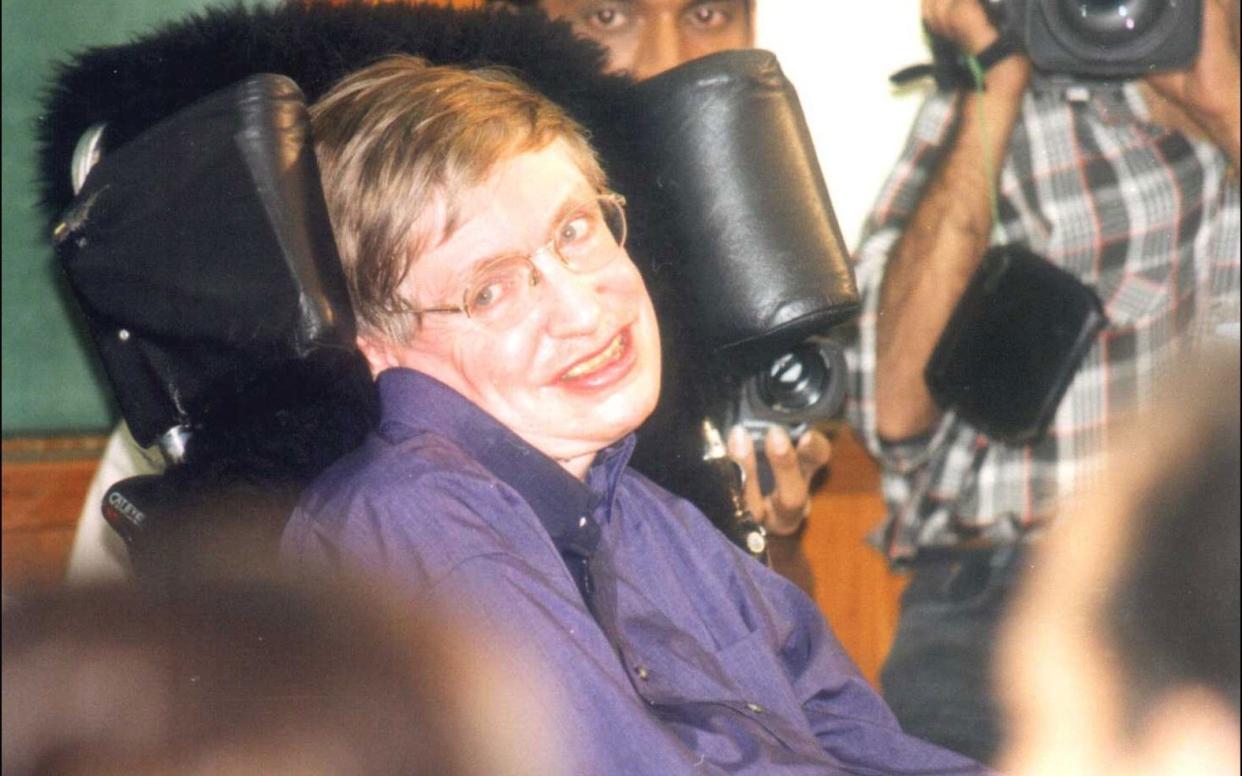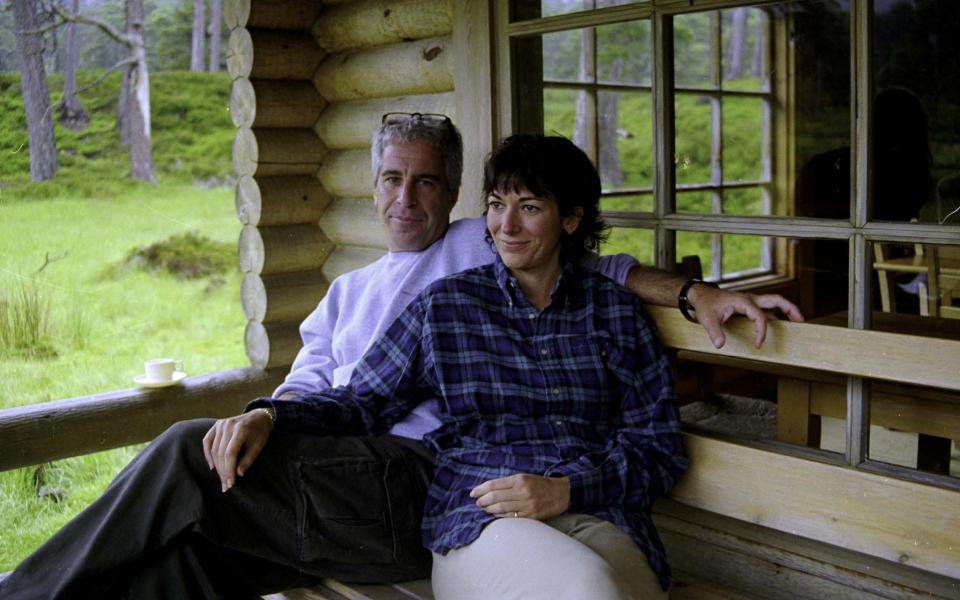Stephen Hawking: how the ‘flawed genius’ wound up in the Epstein scandal

- Oops!Something went wrong.Please try again later.
As a national treasure, Professor Stephen Hawking ticked almost every box.
He had not only made a very real contribution to the sum of human knowledge, but had overcome severe physical challenges to do so. The rational, scientific thinker had miraculously defied medical expectation.
The feted author of A Brief History of Time had become a timeless hero – immortalised, as timeless heroes must be, in a blockbuster film and played by a heartthrob actor.
Prof Hawking, who changed our understanding of the universe and gave us a theory of everything, achieved a rare status in British public life: of a celebrity theoretical physicist. Even those who couldn’t begin to comprehend his work knew his name and recognised his image and his computer-generated voice. Embraced by popular culture, he appeared in The Simpsons, The Big Bang Theory and Star Trek: The Next Generation.
So for many it will have come as a shock to find his name in the Epstein Files, more than 900 pages of documents related to a lawsuit filed against Jeffrey Epstein’s associate and convicted sex offender, Ghislaine Maxwell, that were released by a New York judge on Wednesday night.

The context is disturbing. The filings suggest that Epstein, the late financier and sex offender, told Maxwell she could offer money to friends of Virginia Giuffre, Epstein’s main accuser, if they could “help prove” an allegation that Prof Hawking had participated in an “under-age orgy” was false.
We already knew of some association between Prof Hawking and Epstein: in 2015, photographs emerged of the physicist visiting Epstein’s Caribbean island in March 2006, as part of a trip to a nearby conference. The conference, attended by 20 other scientists, was funded by Epstein, who was arrested in July that year after a grand jury indicted him on a single count of soliciting prostitution.
There is no accusation of any wrongdoing by Prof Hawking. The pictures showed him having a barbecue on Little St James and taking a boat cruise and submarine tour. But the appearance of his name in the newly released papers, among that of others, including Prince Andrew – who denies all allegations against him arising from his relationship with Epstein – and Michael Jackson, are likely to cast a posthumous shadow of doubt over his reputation. Epstein has after all become akin to a virus carrier, infecting all who came into contact with him.
Prof Hawking, who died in 2018 at the age of 76, cannot defend himself against any implied involvement in illegal or sordid acts. But the mention of his name in the Epstein Files might yet prompt a reckoning of sorts.
The celebrated Hawking narrative is well known – thanks in part to the acclaimed 2014 film The Theory of Everything, in which Eddie Redmayne does his Oscar-winning turn as the scientist.

Born in Oxford in 1942, Prof Hawking moved to St Albans, Herts, aged eight. He won a scholarship to study physics at University College, Oxford, graduating in 1962 with a first-class degree. He then moved to the University of Cambridge to carry out postgraduate research in cosmology. He went on to become a research fellow at Cambridge’s Gonville and Caius College.
Prof Hawking became best known for his work on black holes, and for his “theory of everything” that would explain the universe.
Hawking was ‘a true symbol of the triumph of mind over matter’
But his personal life was beset with physical difficulty. At 21, he was diagnosed with a form of motor neurone disease that would confine him to a wheelchair by the age of 30. Doctors had given him 14 months to live. Had they been right, he would not have seen 23. In the event, his 60th birthday party was attended by The Edge from U2. Richard Branson was among the famous guests at his 70th – though Prof Hawking himself couldn’t make it, due to ill health.
In a national newspaper obituary, Nobel Prize-winning mathematical physicist Sir Roger Penrose suggested Prof Hawking “caught the public imagination, as a true symbol of the triumph of mind over matter”; that he was a man whose “physical impairment seemed compensated by almost supernatural gifts”.
But he also acknowledged that this romanticised portrayal only represented part of the truth; that those who knew Prof Hawking appreciated the “dominating presence of a real human being … with normal human weaknesses, as well as his more obvious strengths.”
It’s his “weaknesses” that form another, less well known, strand of the Hawking story.

In a documentary broadcast in 2021, called Hawking: Can You Hear Me?, we glimpsed this counter-narrative when his daughter Lucy described the “brutal” moment he left his family on Christmas Day 1989 for a new life with his carer, Elaine Mason.
His home life was, indeed, complicated: his first wife, Jane, was also in a relationship with another man, Jonathan Jones.
Jane told the Sky Documentaries film: “It was obvious there was a relationship between Stephen and Elaine. They didn’t hide it. By comparison, my relationship with Jonathan was very mild and dedicated to Stephen’s care and keeping the family going.”
‘Sometimes life was so dreadful I wanted to throw myself in the river’
In 2015, Jane told The Telegraph that “sometimes life was just so dreadful, so physically and mentally exhausting, that I wanted to throw myself in the river – although of course I stopped myself because of the children.”
Prof Hawking, a father of three, went on to marry Mason in 1995. They later divorced and he reportedly fell for another of his carers, Diana King, who was 39 years his junior.
In his 2020 book Stephen Hawking: A Memoir of Friendship and Physics, Leonard Mlodinow, a theoretical physicist and friend of Prof Hawking, claimed that Mason once flew into a rage in front of dinner guests as she declared she had been Prof Hawking’s “slave for 20 years.”

Meanwhile, the late businessman Peter Stringfellow once described Prof Hawking as the most “impressive” famous visitor to his strip club. “I went and introduced myself and said, ‘Mr Hawking, it’s an honour to meet you,’” he recalled. “‘If you could spare a minute or two, I’d love to chat with you about the universe.’ Then I paused for a bit and joked, ‘Or would you rather look at the girls?’ There was silence for a moment, and then he answered, “the girls”.’
Others have more subtly helped to flesh out the image of the very human man behind the theories. One of Prof Hawking’s former acquaintances at Gonville and Caius College described him as “very difficult” and said that he was not well liked by other academics at the college, but it was hard to criticise him.
Lawrence McGinty, former science and medical editor at ITV News, interviewed him on more than one occasion, speaks more positively of him, recalling his less serious side. “He was a very humorous guy,” he says.
The myth of Hawking
But as someone with a brilliant brain trapped in a failing body, was there a certain mythologising of him that obscured part of who he really was?
“Stephen Hawking incarnates the mythical figure of the lone genius,” writes the historian and philosopher of science Hélène Mialet in her 2012 book Hawking Incorporated, which seeks to challenge the myth of “the individual, disembodied, rational actor” in science. “He also represents the ‘perfect scientist’ ... the man who can do nothing but ‘sit there and think about the mysteries of the universe.”

Perhaps, knowingly or otherwise, he conspired to some extent with this representation.
“I think he deflected, not with me but with others, questions about his personal life, which is fair enough as a tactic if you’re in his position,” says McGinty. “I don’t think he felt it was relevant to anything he was doing scientifically. I don’t think he recognised people would want to know anything more about him [personally] than that he was a professor at Cambridge.”
Yet if we have learned anything in recent years from the fallout of multiple scandals, the revelations of what our heroes have been up to behind our backs, it is that no one is simply the sum of their talents and achievements. That the more we venerate someone, the harder will be their fall, when it comes.
Prof Hawking has not fallen. But through him and others we are, possibly, learning the dangers inherent in turning a man – or woman – into a myth.

